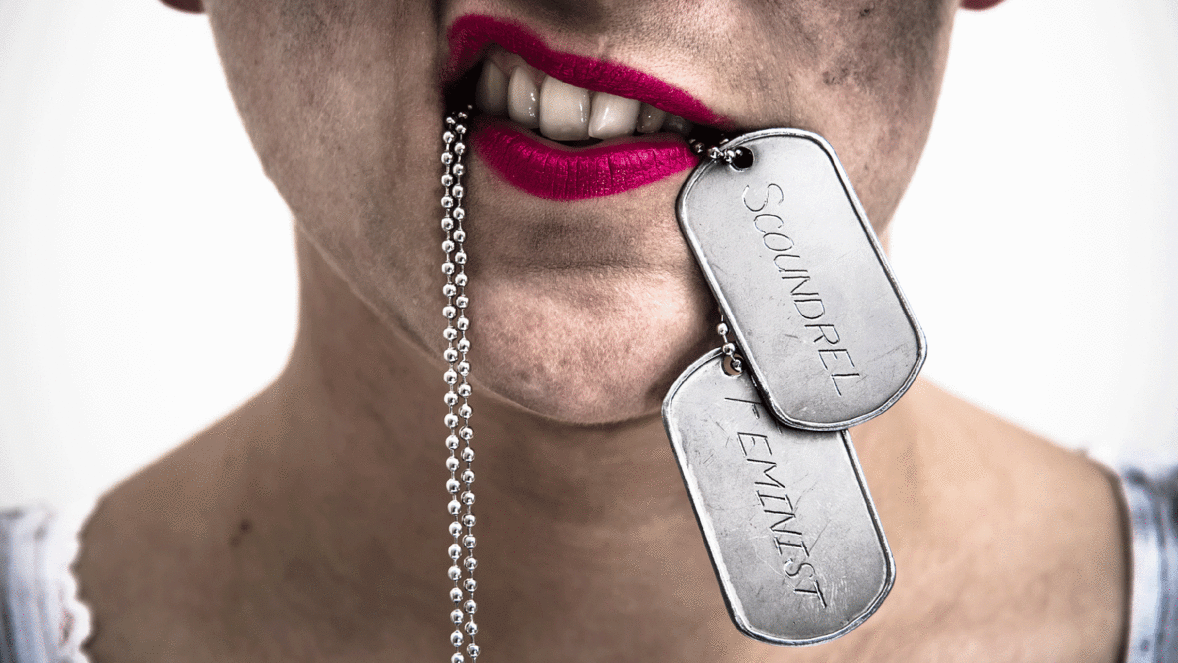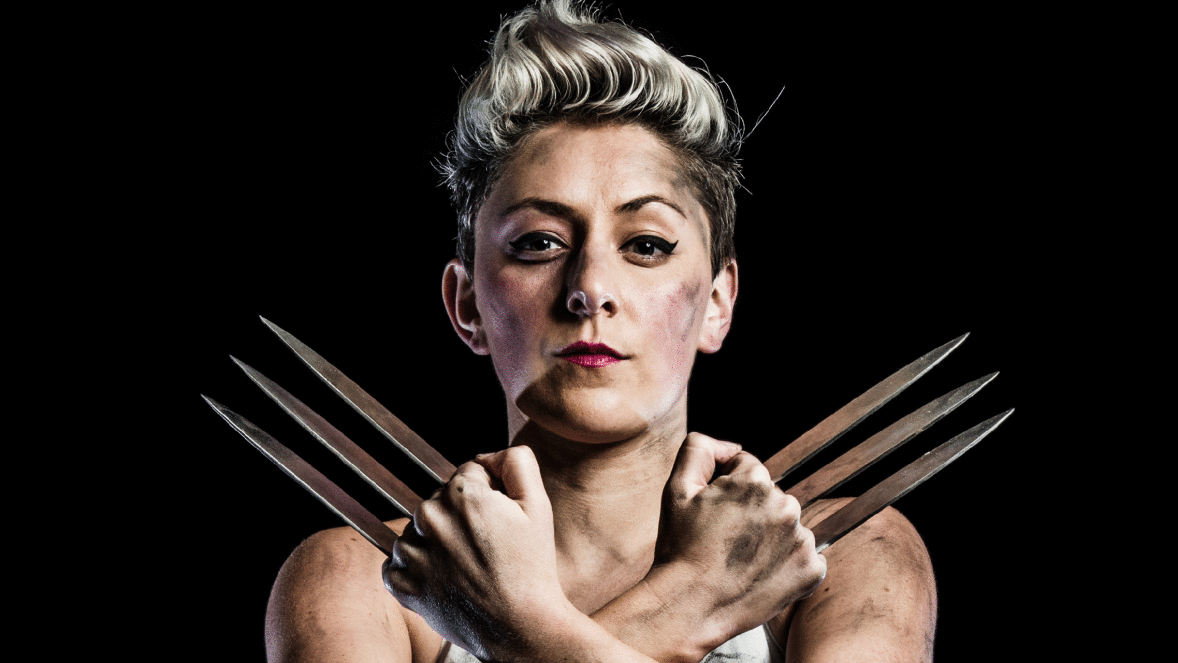
Inspired by a childhood growing up idolising Indiana Jones and Wolverine, though never the women that starred alongside them, Rowena Hutson’s show Strong Female Character examines the problematic relationships we have with the flawed male leads and their forgettable female counterparts. Ahead of her run at the Brisbane Comedy Festival, Rowena spoke to the AU Review about the show, and hints at what we can expect from this diverse and energetic performer.
What was the inspiration for Strong Female Character?
I had had the idea in the back of my brain for a long time that I wanted to explore the dichotomy between my love of action movies (I grew up watching them with my Dad) and my passionate belief in feminism (eg. equality). And then last year I injured my back (the week of my birthday – eurgh) and was stuck in bed for several weeks to recover – so I started watching a whole bunch of new action movies I hadn’t had time to see yet. And I finally watched Guardians of the Galaxy. It was so good, and made me laugh so hard and so much, my housemate actually came in to my room and checked to make sure I was ok and not having some kind of back-pain-induced fit. And then I watched it again. Straight away. Because it was simply so much fun, and I thought it was exactly the kind of action film I would make if I could.
But after I watched it the second time I was suddenly struck by the fact that I wanted to be Peter, not Gamora. And it really brought home to me the idea that we are still, after all these years, watching action films and all wanting to be the handsome scoundrel because they get everything. I mean, they get the ENTIRE story and still be a loveable rogue. And the women, even the ‘strong female characters’ like Gamora, are essentially just the (badass) prize for the hero. And that really troubled me. Because I know so many women who could be just as loveable and stupid and charming and roguish as Peter / Chris Pratt. And how much fun would it be to see a woman do that on screen?! So I wrote a show exploring that.
Like you, I grew up idolising similar male leads, while their female counterparts often faded from my memory, though as I got older, I started to realise how problematic these characters and representations were. When did it first hit you that what you were seeing might be problematic, or perhaps even damaging?
I started noticing that some of the things my favourite heroes did made me feel uncomfortable in my mid-teens. I’d been watching action films since I was relatively small – the by-product of having much older siblings – and I had always wanted to be a hero as a kid. I was obsessed with stories about King Arthur and his knights, and Asterix and Obelix etc., and had always really connected with stories about heroes. And the older I got, the more I liked and looked up to the loveable rogues – the heroes who were scoundrels – funny and flawed.
They seemed more real and human to me. Heroes like Indie, Han Solo and Bill Murray in Ghostbusters. Because they made me laugh as well as save the day. But in my teens I started to notice that some of the things they said or did to the women in those stories make me feel awkward or uncomfortable. And I probably couldn’t have told you why back then.
But it was things like Indie saying he doesn’t like ‘fast women’ and then having a really quite physically aggressive sex scene with said ‘fast’ woman. Or Marty McFly leaving his girlfriend sleeping on the veranda for an entire film while he has adventures without her. Or Han Solo continuing to squeeze Leia’s hands after she has asked him to stop several times. It made me feel really uncomfortable.
But as an adult touring shows around the world I have been lucky enough to be exposed to, and become friends with a lot of really incredible real life heroes and loveable scoundrels who are women. I started to see the differences in how they were cheeky and charming and full of charisma, and broke the rules and still helped people without actually ever putting anyone else down. It made me realise that the (male) heroes I grew up with didn’t have to be the only heroic blueprint we go off.
Do you think there is still something to be gained from these character portrayals, particularly as a woman?
I do actually, and that is partly what the show is about. I still find there is a lot in these characters that can be used for good instead of evil, as it were. Things they can teach us that are really wonderful – because they are archetypal heroes – and heroes can teach us really wonderful things about how to combat adversity (whether real or imagined, physical or emotional etc) or that sometimes it is harder to do what is right than what is easy, or that you look after your family and your friends because no one can be a hero without the love and support of those we love. And they are good things to remember no matter who you are.
And can we still truly enjoy them? Is it perhaps about just taking them at face value, rather than seeing them as inspirational or relatable?
Again, without giving too much away about the show itself, I do think we can still enjoy them. I certainly do. But I also think we need to be open about the whole truth of what they teach us. Pop culture is an incredibly powerful and almost subversive tool. It sinks into our collective consciousness almost without us noticing. So we need to try and work against that a little bit – not take these stories for granted so much. We need to openly discuss the ramifications or the negative impact some of these stories might have, particularly in terms of how women are treated in them.
There seems to be a change finally happening, with female characters every bit as funny and flawed as the male ones, really coming to the fore – women like Rey from The Force Awakens, or Marvel’s Jessica Jones and Agent Carter, both with their own television shows. Is this something you wish you could have had more of growing up? Is it something long overdue?
Oh HELLS YES.
I saw The Force Awakens with my best friend Tess – we are both massive a geeks – and we sat there grinning our heads off, cheering ourselves hoarse and squeezing each other’s hands every time Rey came on screen – because we were just so excited and relieved and overjoyed that finally, here was a Star Wars universe we could actually be a part of! I mean we both love Leia, but we also both wanted to be Han as kids, because he got to have so much more fun.
It just seems so obvious in this day and age, that women are just as human – that is to say, funny and flawed and capable of incredible feats of heroics as men. And actually as the success of things like the Force Awakens and Jessica Jones etc. proves – we are all, men and women alike, really, really, really enjoying seeing these characters on screen and sharing their stories. Finally.
Long may Rey reign!
And finally, what’s next for you? You already work in a variety of genres – is there anything you’re looking forward to trying next?
Ooooh. That’s a good question! There is a whole ream of things I’d love to do. I’m halfway through a new script for a really silly and action-packed zombie-apocalypse style story with three hilarious female leads – so maybe it’s time I got all Simon Pegg/Nick Frost and smashed out a geek-inspired blockbuster?
Rowena Hutson’s Strong Female Character takes over the Graffiti Room at the Brisbane Powerhouse on Tuesday 15 March and runs through until the 20th.
Tickets for her show, and all the Brisbane Comedy Festival events, are available at the Brisbane Powerhouse website.
———-

